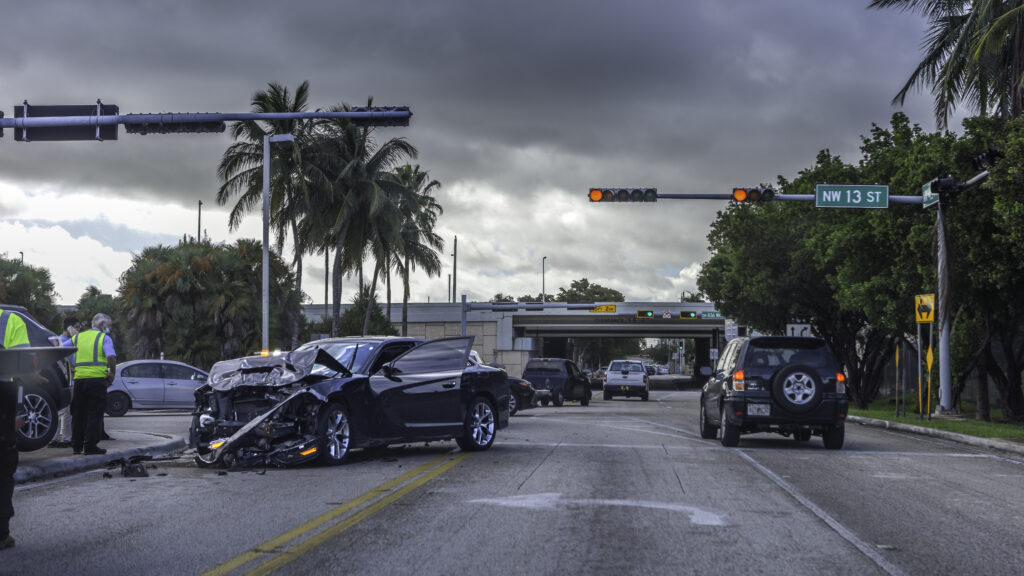Raleigh, NC: (919) 277-9299

Drunk driving was responsible for nearly 12,500 deaths in the United States in 2023, the most recent year for which comprehensive statistics are available. This amounts to nearly 35 deaths each day—and one every 42 minutes. Suing a drunk driver is a leading way for those impacted by their actions to seek retribution for any damages incurred. If a drunk driver injured you or a loved one, let us help you hold them responsible for the injuries they caused.
What Is a Drunk Driving Lawsuit?
A drunk driving lawsuit is a type of personal injury case filed by an individual who has experienced damages resulting from an impaired driver’s actions. The civil lawsuit, typically filed with the help of an auto accident attorney, most often seeks financial retribution for any damages the claimant has experienced in the auto accident.
Drunk driving lawsuits are separate from any criminal DUI cases brought by state or federal authorities, which typically aim to punish the drunken driver for his or her actions via fines, license suspension or revocation, or jail sentences. A claimant can sue a drunk driver, in a civil suit, even if the impaired driver has already been sentenced for drunk driving in a criminal case, and the civil case can proceed regardless of whether the driver is found guilty of drunk driving in a criminal case.
Potential Damages
An attorney can help a claimant seek three primary types of auto accident damages in a drunk driving lawsuit:
1. Economic Damages
This type of damages includes the following financial losses:
- Medical expenses
- Lost income or lowered earning capacity
- Losses from property damage, including the repair or replacement of any vehicles damaged in the accident
2. Non-Economic Damages
These are the less-tangible damages caused by an auto accident, and may include:
- Pain and suffering resulting from any injuries sustained in the accident
- A reduced quality of life or ability to enjoy activities as the result of any physical or mental limitations brought about by injuries sustained in the accident
- A loss of consortium (e.g., love, companionship, and support) for any family members whose loved ones are killed or severely injured in the accident
3. Punitive Damages
These damages are designed to punish the at-fault driver for his or her actions and to dissuade any future occurrences of the activity. The amounts awarded can be substantial in some cases, as certain jurisdictions place no caps on the punitive damages allowed in drunk driving lawsuits.
A wrongful death claim may result after a DUI accident causes a fatality. A wrongful death civil suit is a lawsuit filed against the at-fault party by the surviving family members of a person killed in an accident. These suits are often filed with the help of a lawyer and typically seek retribution for any damages resulting from a fatality caused by negligence or a harmful act; the possible types of damages claimed include economic, non-economic, and punitive.
What a Viable Drunk Driving Lawsuit Must Prove
For a lawsuit to be viable, a claimant and his or her attorney(s) must prove these key elements:
A Breach in the Duty of Care
All drivers owe a duty of care to other drivers on the road, and claimants in drunk driving lawsuits must prove that the at-fault driver breached this duty by driving under the influence of alcohol. Evidence supporting this assertion can include blood alcohol content test results, slurred speech or impaired balance on the part of the driver, witness observation of the driver’s alcohol intake and/or inebriation, and the presence of alcohol containers in the vehicle.
The Existence of Damages
The claimant must show that he or she sustained actual losses as a direct result of the accident; possible damages include economic and non-economic. To prove this, a lawyer can help a claimant gather bills and invoices for auto repairs; medical records documenting emergency care and surgical procedures; documentation of lost income and/or earning capacity; and visual evidence such as photos and video from the accident scene, as evidence.
The Accident’s Causation
The driver’s actions and/or negligence must be shown to be the direct cause of the damages experienced by the claimant. An attorney can be instrumental in helping a claimant gather police reports, witness testimony, results of the drunk driver’s breathalyzer or blood test, and crash scene documentation such as photos and videos, as evidence to support the claim. (Note: In some areas, including North Carolina, a legal concept known as contributory negligence can limit or even negate the damages a claimant may seek if his or her actions played any role in causing the accident.)
The science-based gathering of evidence such as police reports, toxicology reports, witness testimony, physical evidence from the crash scene, and video footage of the accident can be critical to supporting a drunk driving lawsuit. An auto accident lawyer can provide essential support in the gathering of evidence, along with offering helpful insight about the legal process, DUI accident law, and beyond.
If you’ve experienced injuries in an auto accident caused by a drunk driver, reach out to us today—the attorneys at Bell Legal Group want to hear your story.
